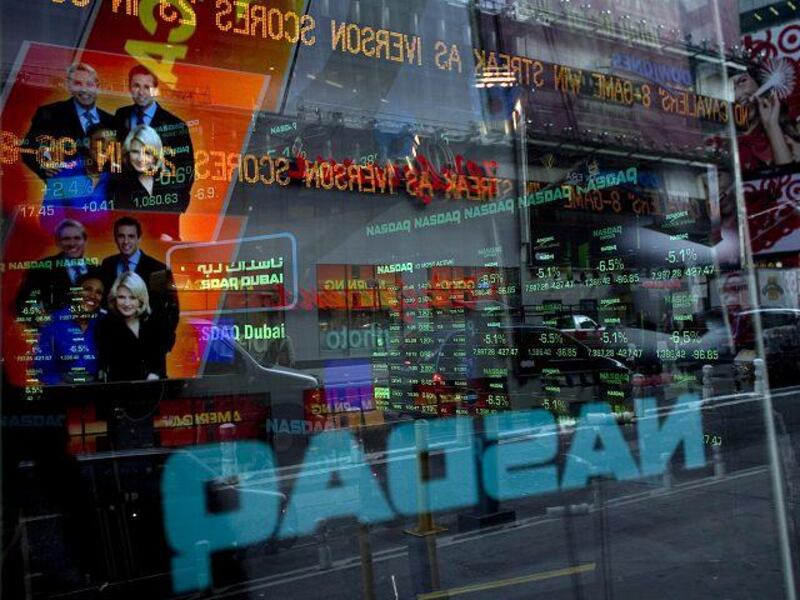Over at Nasdaq Dubai, chief executive Jeff Singer is facing a tricky little dilemma - how to sustain his exchange's ambitions to be the pre-eminent financial marketplace of the Gulf region when he faces a virtual wipeout of daily trading activity. Coming up to the end of his first year in charge of Nasdaq Dubai, Singer has steered it through the crash of the global financial system, added some new listings, initiated a controversial but potentially lucrative derivatives trading programme, and drawn up some pretty ambitious plans for regional expansion.
But all that could be put at risk if the suggested deal goes through to sell a chunk of shares in DP World, the global ports operator and ND's biggest stock by far. A sale of the DP World (DPW) free float would reduce daily trading volumes to a trickle, undermining Nasdaq Dubai's plans to create a real international exchange in the Gulf. Just how important DPW is to Nasdaq Dubai can been gauged from last Thursday's trading statistics. Of the 4.4 million or so shares traded, 4.1 million were those of DPW. Of the 35 securities listed on ND, only three were traded, and DPW was by far the biggest. It has been the same virtually every day since DPW floated in 2007.
Last month trading in DPW was temporarily suspended pending an announcement, which eventually informed the world that DPW was in talks that could lead to the sale of a large stake to a private equity group. No further details were provided - and indeed the absence of specifics about the proposed deal was underlined at DPW's recent annual meeting - but informed speculation had it that the putative bidder was Abraaj Capital, the region's biggest private equity group.
You can see why Abraaj might want a chunk of DPW. At 39 cents per share, the company looks extremely good value, certainly when compared with its float price of $1.30. Since the acquisition of the P&O business in 2006, DPW has become a truly world-class organisation, even against the background of global recession. When recovery arrives, the international shipping business will be one of the first sectors to benefit. DPW will generate cash at a rate fast enough to satisfy even the hungriest private equity company.
The problem - and the root of Singer's dilemma - was the fact that DPW said the shares for sale would come "largely" from the free float of stock traded on Nasdaq Dubai. That amounts to 23 per cent of the total, with the balance held by government-owned Dubai World. As it emerged that Abraaj was looking for a stake of around 15 per cent, this would leave only a minimal number of shares in the public domain.
Delisting of DPW would be a real possibility. It must be stressed that the whole issue is clouded with uncertainties. Where did the pressure come from to consider a share sale? If it was from the majority owner, Dubai World, the logic is difficult to grasp. In these cash-strapped times, Dubai World needs resources for other parts of its business, notably the property group, Nakheel. But this need could only be satisfied if the shares were sold from Dubai World's 77 per cent holding. If the cash went to the private investors of the free float, it would only end up back in the great melting pot of international equity funds.
Other uncertainties have emerged since. As the silence about the deal continued, some observers began to question whether the Abraaj approach was serious, or whether Abraaj was a stalking horse for a bigger investor, perhaps even a trade partner, for DPW. With no further clarity emerging, there is a reasonable chance the Abraaj talks will stall, perhaps on the question of price. The 23 per cent stake is valued at around $1.5 billion in the market. Add on a decent seller's premium, and you quickly get to a minimum price tag of $2 billion to take DPW private. Abraaj is cash-rich, with nearly $3 billion in its latest buyout fund, but perhaps it does not want to put so many of its eggs in the DPW basket.
There is another issue of importance for Dubai Inc. Since the P&O deal, DPW has been a shining example of good governance and international best practice in a region where such qualities are sometimes in short supply. It has put in place audit and remuneration committees to meet the most exacting of international global standards, and run board meetings along globally recognised lines. All that could be threatened if it were taken private.
A far more practical transaction would be for Dubai World to consider selling a portion of its DPW shares, either to Abraaj or some other private equity group, or to a trade investor. That would raise cash for the Dubai Government, but retain the public listing and corporate ethos of DPW. It would also avoid a major problem for Nasdaq Dubai. Singer has other planned listings on the agenda. He also has some grand plans for regional expansion, and ideas on how to overcome the problems of a region which simply has too much exchange capacity - this relates to the Gulf in general, but the UAE in particular.
Some experts think the post-crisis financial world will be ready for a new wave of consolidation of stock exchanges. As a vibrant and ambitious centre, Nasdaq Dubai is well placed to be a prime mover in this new regime. If it loses DP World, the jewel in its crown, it could find itself on the sidelines. fkane@thenational.ae






